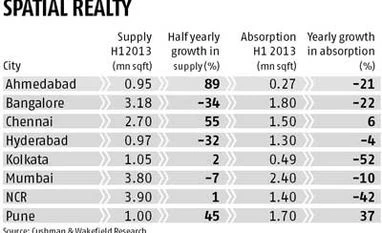The office market in India might see some uptick towards the end of this year, according to a Cushman & Wakefield report.
By the end of the year, office space absorption is expected to be 30 million sq ft (msf), led by markets in Bangalore, Pune and Mumbai. For 2012, the total absorption was 27-28 msf.
The initial sign of the pick-up is evident in the total absorption registered in the second quarter of calendar year 2013, said the report. The April-June period recorded absorption of 7.2 msf, marginally higher than the same period last year but better than the 3.6 msf in the first quarter of 2013.
“I think from here on, we will see a positive uptick in the commercial/office space segment. Over the last year or two, we have seen over-supply and an overall economic environment that resulted in a cautious outlook. The current uptick is due to pent-up demand among corporates, who preferred to have a cautious outlook,” said Ravi Ahuja, executive director, Cushman & Wakefield.
For the first half of 2013, absorption fell in the office market. The total net absorption across eight cities — Ahmedabad, Bangalore, Chennai, Hyderabad, Kolkata, the National Capital Region, Mumbai and Pune — denoted a decline of 15 per cent at 10.9 msf, compared to the same period last year. This was primarily due to the dismal performance in the first quarter of the year.
Net absorption refers to new leasing activity within a city and includes only the incremental new space take-up in instances of relocations and expansion from within the city. It does not include lease renewals and relocations to office spaces with the same areas.
Beating the national trend, Pune recorded an increase of 37 per cent in absorption of office space in the first half of calendar 2013 over the first half of 2012, with consistent levels in both quarters. In the second quarter, Pune saw total supply of 364,000 sq ft.
Chennai was the only other region with a positive trend. Half-yearly net absorption rose nearly six per cent versus the first half in 2012. The second quarter saw absorption of 1.4 msf, a huge increase over the first quarter. Leasing transactions in Grade-A commercial office spaces with the IT sector continued to be the major demand driver, followed by the banking, financial services and insurance sector.
By the end of the year, office space absorption is expected to be 30 million sq ft (msf), led by markets in Bangalore, Pune and Mumbai. For 2012, the total absorption was 27-28 msf.
The initial sign of the pick-up is evident in the total absorption registered in the second quarter of calendar year 2013, said the report. The April-June period recorded absorption of 7.2 msf, marginally higher than the same period last year but better than the 3.6 msf in the first quarter of 2013.
“I think from here on, we will see a positive uptick in the commercial/office space segment. Over the last year or two, we have seen over-supply and an overall economic environment that resulted in a cautious outlook. The current uptick is due to pent-up demand among corporates, who preferred to have a cautious outlook,” said Ravi Ahuja, executive director, Cushman & Wakefield.
For the first half of 2013, absorption fell in the office market. The total net absorption across eight cities — Ahmedabad, Bangalore, Chennai, Hyderabad, Kolkata, the National Capital Region, Mumbai and Pune — denoted a decline of 15 per cent at 10.9 msf, compared to the same period last year. This was primarily due to the dismal performance in the first quarter of the year.
Net absorption refers to new leasing activity within a city and includes only the incremental new space take-up in instances of relocations and expansion from within the city. It does not include lease renewals and relocations to office spaces with the same areas.
Beating the national trend, Pune recorded an increase of 37 per cent in absorption of office space in the first half of calendar 2013 over the first half of 2012, with consistent levels in both quarters. In the second quarter, Pune saw total supply of 364,000 sq ft.
Chennai was the only other region with a positive trend. Half-yearly net absorption rose nearly six per cent versus the first half in 2012. The second quarter saw absorption of 1.4 msf, a huge increase over the first quarter. Leasing transactions in Grade-A commercial office spaces with the IT sector continued to be the major demand driver, followed by the banking, financial services and insurance sector.
Similarly, fresh supply during the first half also declined by three per cent and was recorded at 17.6 msf. Vacancy rates at the end of the second quarter were noted at 19.6 per cent, an increase of 1.7 percentage points over the same period last year.
Also, there was increase in pre-commitments in the second quarter, of 2.65 msf, in Bangalore, Hyderabad, Mumbai and Pune.
Ahuja also stated that rentals in certain regions had started to see an uptick. Other than the IT sector, he said growth for commercial space will be driven by segments such as pharmaceuticals and banking & finance. “The pharma sector is going very active. We have met around three to four large players who are looking at consolidating their operations,” he said.
)